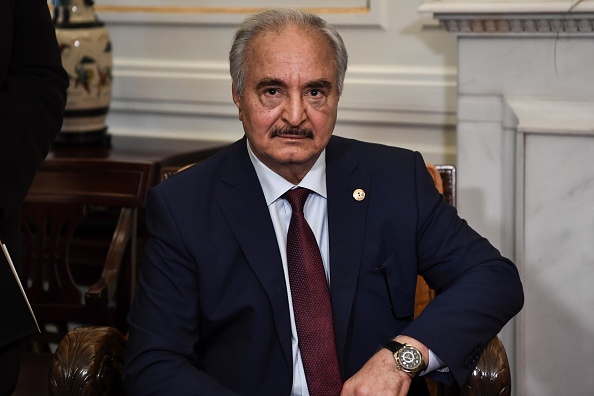The Tripoli-based Government of National Accord (GNA), which was formed in 2015 through a UN-brokered agreement approved by the Security Council, has struggled to establish control over the country. Formally, the GNA has been supported by the United States and the European Union, but its main backers in recent years have been Italy, Turkey and Qatar.
The UAE, Egypt, France and Russia have all been supporting Field Mashal Khalifa Haftar, who since 2014 has built a military alliance that has consolidated control in eastern Libya — through campaigns in Benghazi and Derna — and expanded into much of southern Libya.
Until recently, Haftar had the edge in Libya. By the end of 2019, his forces had made inroads into the capital’s suburbs and he seemed poised to enter Tripoli after a year-long offensive before the Turkish president, Recep Tayyip Erdoğan, took the bold step of declaring overt support for the GNA.
Turkey’s foray is motivated by its own strategic, political and economic interests. In November last year, Erdogan signed an agreement on maritime boundaries in the east Mediterranean with Serraj. The agreement threatens to block the EastMed project: a proposed Cypriot-Greek-Israeli pipeline to Europe. Turkey was left out of the pipeline because of the historical dispute over Cyprus. It is the third-largest island in the Mediterranean split into a Turkish half in the north and a Greek half in the south since 1974. Both sides claim sovereignty over the valuable gas reserves discovered ten years ago off the coast of Cyprus. Erdogan intends for Turkey to partake in the exploits and can now count on the support of the UN-backed party in Libya. Alongside its goal to undermine the emerging security and energy framework in the Eastern Mediterranean, Ankara desires to tip the balance in its favour in the power struggle with regional rivals and to secure its financial and energy interests in Libya and the broader Eastern Mediterranean.

Erdogan is now challenging Haftar’s influence in the eastern Mediterranean. In the past month – and recent days, in particular – Turkey has deepened its imprint in Libya as it chalked up a series of victories, culminating in the seizure of a key airbase and the town of al-Asabaa from Haftar’s forces. The general has since announced a partial withdrawal from Tripoli’s front lines. Along with sending troops and thousands of Syrian militiamen, Turkish drones and air defense systems have helped the GNA to reverse the LNA’s gains and altered the course of a war.
But, despite the GNA’s gains in the past month, the war is far from over. On April 27, Haftar declared military rule in the country’s east and this week, he called on his forces to rally against Turkey. In an audio message addressed to his forces, urged them to battle the “colonial” intervention by Turkey until its defeat, in a reference to one-time Ottoman control of Libya. Haftar’s comments were released as U.S. President Donald Trump appealed for a rapid de-escalation of the conflict in Libya in a call with Turkish counterpart Tayyip Erdogan. Haftar’s forces still launch missile attacks on Tripoli each day and control Libya’s oil. They will also remain difficult to displace from Tarhouna, their last stronghold and a key staging and logistics post for Haftar in western Libya. As Ankara’s allies in Tripoli attempt counterattacks against pro-Haftar strongholds, Turkey risks being dragged deeper into the war. Further escalation is a distinct risk and could both backfire for Ankara and come at the expense of Libyans at large.
Turkey’s intervention has prolonged and exacerbated an already deadly war. The clear division between the east and west looks set to deepen, leading to a new stage of slow, grinding conflict. It has also pushed the country further even from a negotiated political solution. Diplomatic initiatives in January, in Moscow and then in Berlin, provided a glimmer of hope that negotiations would indeed begin, but these failed to produce any meaningful results, and the resignation of UN Special Representative to Libya Ghassan Salamé further undermined chances of reviving them. Instead, the Haftar camp returned to its military solution strategy, and the GNA did the same. In the same month, Haftar-allied tribal seized Libya’s eastern oil terminals, blocking exports, saying they did not want to see Libya’s oil revenues used to pay for Turkish and Turkey-backed forces. This shutdown has cut off almost all state revenues that were keeping the Tripoli government afloat.
Domestically, there are also signs of fatigue with Turkey’s military campaigns abroad which has little buy-in among ordinary Turkish citizens. Public support for Turkey’s recent Idlib intervention was markedly lower than for Turkey’s other military campaigns in Syria. At the same time, the coronavirus pandemic will likely increase the public’s questioning of foreign military campaigns. Ankara will be hard-pressed to avoid any major loss of lives of its soldiers, while also maintaining the image of a successful policy to cultivate support for its Libya operations. Meanwhile, Libyans who prior to Turkey’s intervention were sitting on the fence and did not claim allegiance to either side in the war also have criticised Turkey’s intervention.






